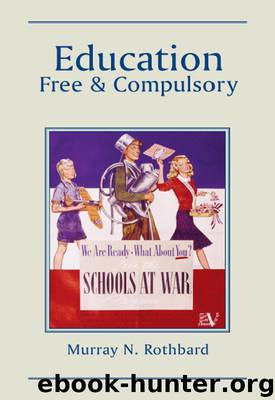Education Free & Compulsory by Murray N. Rothbard

Author:Murray N. Rothbard
Language: eng
Format: epub
ISBN: 9780945466222
Publisher: Ludwig von Mises Institute
France
Universal compulsory education, like compulsory military service, was ushered into France by the French Revolution. The revolutionary Constitution of 1791 decreed compulsory primary instruction for all. The Government could not do much to put these principles into effect at first, but it tried its best. In 1793, the Convention prescribed that the French language be the sole language of the “republic, one and indivisible.” Little was done until the advent of Napoleon, who established a comprehensive state education. All schools, whether public or nominally private, were subject to the strict control of the national government. Dominating the entire system was the “University of France,” which was established to insure uniformity and control throughout the entire French educational system. Its chief officials were appointed by Napoleon, and no one could open a new school or teach in public unless he was licensed by the official university. Thus, in this law of 1806, Napoleon acted to secure a monopoly of teaching to the State. The teaching staff of the public schools were to be routed through a normal school operated by the State. All these schools were directed to take as the basis of their teaching the principles of loyalty to the head of the State, and obedience to the statutes of the university. Due to lack of funds, the system of public schools could not then be imposed on all. By the end of the Napoleonic era, slightly less than half of French children attended public schools, the rest largely in Catholic schools. The private schools, however, were now under the regulation of the State and were obliged to teach patriotism on behalf of the rulers.
With the Restoration, the Napoleonic system was largely dismantled and education in France became predominantly a Catholic Church affair. After the revolution of 1830, however, Minister Guizot began to renew State power in his act of 1833. Attendance was not made compulsory, and the private schools were left intact, except for the significant requirement that all educational institutions must teach “internal and social peace.” Complete liberty for private schools was restored, however, by the Falloux Law, passed in 1850 by Louis Napoleon.
With the exception, then, of the Revolutionary and Napoleonic periods, French education remained free until the latter part of the nineteenth century. Just as Prussian compulsion and absolutism had received a great impetus from the defeat at the hands of Napoleon, so did French compulsion and dictation receive its inspiration from the victory of Prussia in 1871. The Prussian victories were considered the victories of the Prussian army and the Prussian schoolmaster, and France, driven by the desire for revenge (revanche), set about to Prussianize its own institutions. In acts of 1882 and 1889, it inaugurated universal military conscription on the Prussian model.
Leader in the new policy was Minister Jules Ferry. Ferry was the main champion of a new policy of aggressive imperialism and colonial conquest. Aggressions were carried on in North Africa, in lower Africa, and in Indochina.
Demands for compulsory education arose from the goal of military revanche.
Download
This site does not store any files on its server. We only index and link to content provided by other sites. Please contact the content providers to delete copyright contents if any and email us, we'll remove relevant links or contents immediately.
| Administration | Assessment |
| Educational Psychology | Experimental Methods |
| History | Language Experience Approach |
| Philosophy & Social Aspects | Reform & Policy |
| Research |
The Art of Coaching Workbook by Elena Aguilar(48350)
Trainspotting by Irvine Welsh(20089)
Twilight of the Idols With the Antichrist and Ecce Homo by Friedrich Nietzsche(17722)
Fangirl by Rainbow Rowell(7847)
Periodization Training for Sports by Tudor Bompa(7343)
Change Your Questions, Change Your Life by Marilee Adams(6665)
This Is How You Lose Her by Junot Diaz(5802)
Grit by Angela Duckworth(4748)
Red Sparrow by Jason Matthews(4688)
Asking the Right Questions: A Guide to Critical Thinking by M. Neil Browne & Stuart M. Keeley(4603)
Paper Towns by Green John(4179)
Room 212 by Kate Stewart(4117)
Ken Follett - World without end by Ken Follett(3984)
The Sports Rules Book by Human Kinetics(3597)
Housekeeping by Marilynne Robinson(3424)
The Motorcycle Diaries by Ernesto Che Guevara(3345)
Introduction to Kinesiology by Shirl J. Hoffman(3307)
Exercise Technique Manual for Resistance Training by National Strength & Conditioning Association(3302)
Double Down (Diary of a Wimpy Kid Book 11) by Jeff Kinney(3287)
